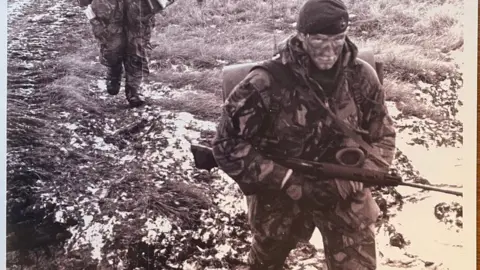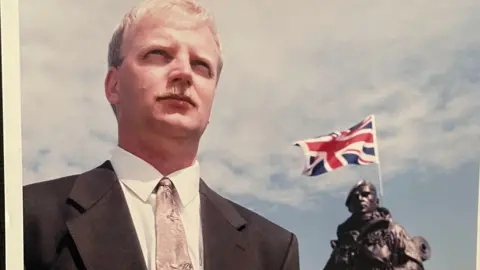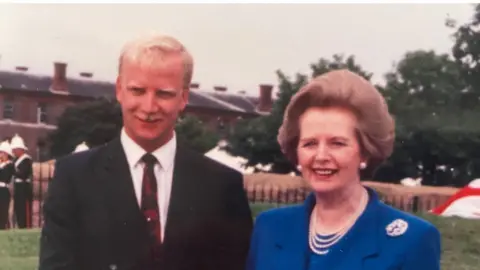Falklands veteran on the victory picture that went global
Forty years ago Peter Robinson, a corporal with the Royal Marines, was photographed carrying the Union Jack aloft as he marched towards Stanley in the final hours of the Falklands War.
It was June 14, 1982, and that photograph, known as The Yomper, came to symbolise the fighting spirit and determination the British soldiers displayed during the conflict.
"The rumour came round that there were white flags flying in Stanley and the Argentinians had surrendered," Mr Robinson told BBC Wiltshire.
"The marine in front of me had a union flag so we found some black masking tape and stuck it on my aerial and just carried on our way."
'Front page'
Naval photographer Pete Holdgate happened to be in the long line of men behind Robinson; eager to capture an image for the magazine of the Royal Marines, Globe and Laurel.
He had just a few seconds to take the picture as the flag billowed in a gust of wind.

Mr Robinson, who lives in Purton near Swindon, said: "Pete shouted to me and said, 'Watch out, that's going to be on the front page.'
"From then on, it just went global and became the image of the Falklands. I'm very proud to be in it.
"I'm glad in a sense that it was my back," he continued, "because it represents everyone that was involved in the conflict.
"It's not just centred on one individual."
 MOD
MODMr Robinson, a former corporal with the elite commando force, was in charge of two relatively new Milan anti-tank missiles during the Battle of Two Sisters on the night of 11 June.
"I was given permission to open fire and a missile did actually take out the Argentinian machine gun position.
"The guys on the ground had never seen this system before, because it was so new.
"A voice came over the radio saying, 'I don't know what that was, but could we have another one please?' So there's always humour in the face of adversity."
Cold day
The conflict resulted from the long-standing dispute with Argentina over the sovereignty of the Falkland Islands and South Georgia, which lie in the Atlantic to the east of Argentina.
The British government dispatched a naval task force to retake the islands by amphibious assault when Argentine forces invaded on 2 April.
The soldiers had to endure the extreme conditions of a South Atlantic winter. There was snow on the ground as they made their way to Stanley to celebrate the end of the campaign.
"It was a cold day that day. My hands are clenched together trying to keep my fingers warm," Mr Robinson said.
 MOD
MOD"I remember the only way we could dry any of our kit was around our waist so my waist was basically a washing line with all my socks on to get them dry."
The flag in the photograph has sadly been lost, but the famous picture which became known as The Yomper inspired a three-tonne (472st) statue.
In 1992 Robinson was invited to Portsmouth with Margaret Thatcher for the unveiling at the Royal Marines Museum at Eastney.
"She said, 'These people haven't only come to see me, but they've come to see you as well," Mr Robinson said.

"I don't like being turned into a hero. A lot more guys out there did a lot more than what I did. It was just the fact that my photograph became the image.
"A lot of Royal Marines remember this photograph. Some of the younger guys come up to me and say, 'you're the reason I joined.'
"I always apologise profusely."
Many soldiers who served in the Falklands conflict have suffered from PTSD. Some veterans have even taken their own lives as cases have gone undiagnosed for years.
Mr Robinson said he feels fortunate to have been able to put his experiences behind him.
"I was 24-years-old at the time. Somewhere in the back of my mind those memories are still there, but I've built a brick wall and keep them to the back and get on with life."

Follow BBC West on Facebook, Twitter and Instagram. Send your story ideas to: bristol@bbc.co.uk
Additional reporting by Ben Prater and Deborah Collins.
